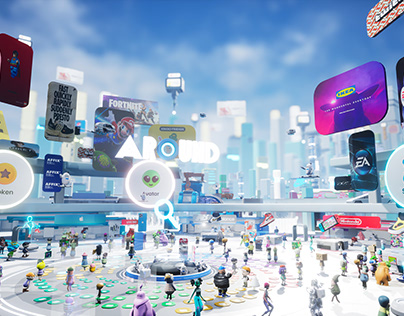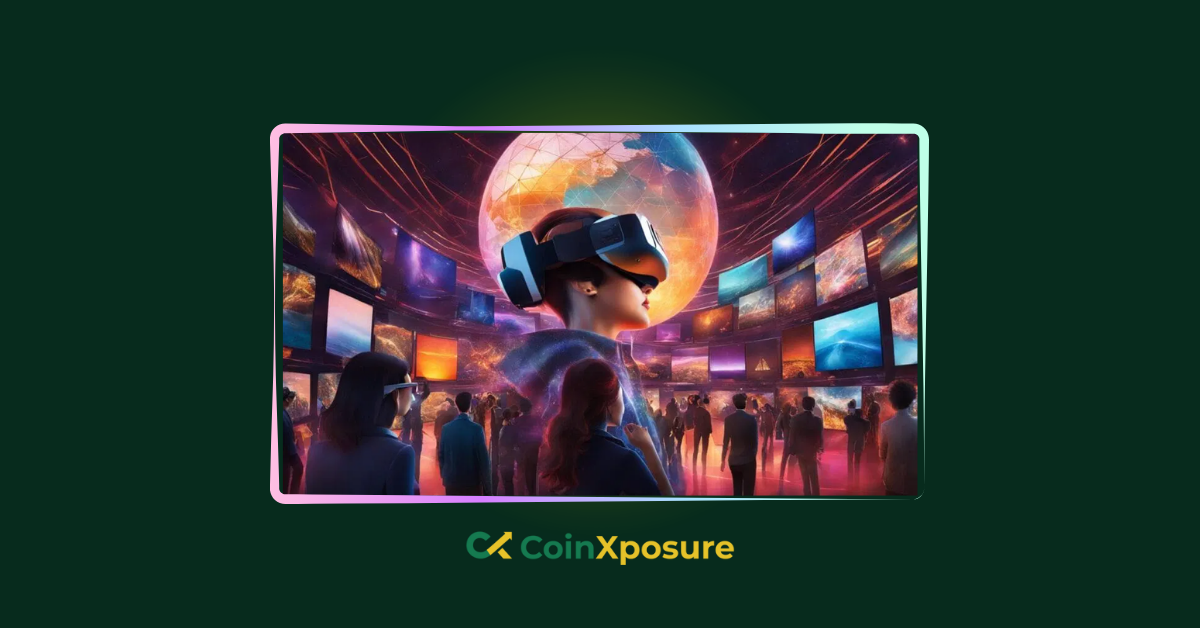With the growth of the VR community, the demand for VR-based products and services has also risen. However, there is a need for a reliable and secure marketplace for the exchange of virtual assets and services within the VR ecosystem.
This is where blockchain technology comes in. Blockchain-based VR marketplaces offer a decentralized and transparent platform for the exchange of virtual assets and services. They provide the VR community with a reliable and secure platform for exchanging virtual goods, creating new content, and engaging in new experiences.
This article will explore the benefits of blockchain-based VR marketplaces, examine existing platforms, discuss potential use cases, and consider the challenges and limitations that must be addressed for broader adoption.
Ultimately, blockchain-based VR marketplaces have the potential to empower the VR community and fuel innovation within the industry.
Overview of Blockchain-based VR Marketplaces
Blockchain-based VR marketplaces are online platforms that use blockchain technology to facilitate the exchange of virtual assets and services within the VR ecosystem. These marketplaces allow users to buy, sell, and trade virtual assets such as virtual real estate, digital assets, gaming items, and even virtual event tickets.
By leveraging blockchain technology, these marketplaces offer several advantages over traditional centralized platforms, including increased transparency, security, and decentralization.
Blockchain-based VR marketplaces typically use non-fungible tokens (NFTs) to represent virtual assets, which are unique digital assets that cannot be replicated or exchanged for other tokens. This provides a high degree of ownership and control over virtual assets, allowing users to easily transfer and trade them without the need for intermediaries.
Furthermore, these marketplaces use smart contracts, self-executing code that automatically executes the terms of an agreement between parties, to ensure that transactions are carried out in a secure and transparent manner.
This eliminates the need for a central authority to manage the exchange and ensures that transactions are immutable and tamper-proof.
Blockchain-based VR marketplaces offer a unique and innovative solution for the exchange of virtual assets and services within the VR ecosystem, empowering the VR community and fueling innovation within the industry.
Advantages of Blockchain-based VR Marketplaces
There are several advantages to using blockchain-based VR marketplaces over traditional centralized platforms. These include:
- Transparency
- Security
- Decentralization
- Tokenization
- Smart contracts
Transparency
Blockchain-based VR marketplaces use distributed ledger technology to create a transparent and immutable record of all transactions. This allows users to easily track and verify the ownership and history of virtual assets, promoting greater trust and accountability within the VR ecosystem.
Security
Blockchain-based VR marketplaces are inherently secure, as they use cryptographic algorithms to encrypt and protect user data. Furthermore, the use of smart contracts ensures that transactions are carried out in a secure and tamper-proof manner.
Decentralization
By leveraging decentralized networks, blockchain-based VR marketplaces eliminate the need for intermediaries, reducing costs and promoting greater efficiency within the ecosystem.
Tokenization
Blockchain-based VR marketplaces use NFTs to represent virtual assets, providing a high degree of ownership and control over these assets. This enables users to easily transfer and trade virtual assets without the need for intermediaries.
Smart contracts
Smart contracts provide an automated and transparent way to execute transactions, eliminating the need for intermediaries and reducing the risk of fraud and error.
These advantages make blockchain-based VR marketplaces a more efficient, secure, and transparent way to exchange virtual assets and services within the VR ecosystem.
Existing Blockchain-based VR Marketplaces
There are several existing blockchain-based VR marketplaces that have gained traction in the VR community. These include:
- Decentraland
- Somnium Space
- Cryptovoxels
Decentraland
Decentraland is a decentralized virtual world that allows users to buy, sell, and trade virtual real estate using blockchain technology. Users can also create and monetize their own content within the platform.
Somnium Space
Somnium Space is a decentralized social VR platform that allows users to buy and sell virtual land, items, and experiences using blockchain technology. Users can also create and monetize their own content within the platform.
Cryptovoxels
Cryptovoxels is a decentralized virtual world that allows users to buy, sell, and trade virtual real estate and other assets using blockchain technology. Users can also create and monetize their own content within the platform.
These marketplaces all use NFTs and smart contracts to facilitate secure and transparent transactions, providing users with a reliable and efficient way to exchange virtual assets and services within the VR ecosystem.
They also offer unique and innovative features, such as the ability for users to create and monetize their own content, which helps to promote innovation and creativity within the VR industry.
Use cases for Blockchain-based VR Marketplaces
Blockchain-based VR marketplaces have a wide range of potential use cases, including:
- Virtual real estate
- Digital assets
- Content creation and distribution
- Virtual commerce
Virtual real estate
One of the most popular use cases for blockchain-based VR marketplaces is the exchange of virtual real estate. Users can buy, sell, and trade virtual land, buildings, and other assets using NFTs and smart contracts, creating a decentralized and transparent marketplace for virtual real estate.
Digital assets
Blockchain-based VR marketplaces can also be used to exchange other digital assets, such as gaming items, collectibles, and virtual event tickets. By using NFTs and smart contracts, these marketplaces can provide a secure and transparent platform for exchanging these assets.
Content creation and distribution
Blockchain-based VR marketplaces can also be used to facilitate content creation and distribution within the VR ecosystem. By allowing users to create and monetize their own content within the platform, these marketplaces can promote innovation and creativity within the industry.
Virtual commerce
Blockchain-based VR marketplaces can also be used to facilitate virtual commerce, allowing users to buy and sell virtual products and services within the VR ecosystem. This can include everything from virtual goods and services to virtual experiences and events.
Blockchain-based VR marketplaces have a wide range of potential use cases, enabling the VR community to exchange virtual assets and services in a secure, transparent, and decentralized manner.
Challenges and limitations
While blockchain-based VR marketplaces offer many advantages over traditional centralized platforms, there are also several challenges and limitations that must be addressed. These include:
- Adoption
- Scalability
- Interoperability
- Regulation
- Technical limitations
Adoption
One of the main challenges facing blockchain-based VR marketplaces is adoption. These platforms are still relatively new and may not have the same level of awareness and trust as traditional platforms. This could limit their ability to attract users and build a strong community.
Scalability
Another challenge facing blockchain-based VR marketplaces is scalability. As more users join the platform and the volume of transactions increases, the blockchain may become congested, leading to slower transaction times and higher fees.
Interoperability
Many blockchain-based VR marketplaces are designed as closed ecosystems, which may limit their ability to interoperate with other platforms and services. This could create barriers to entry and limit the potential for innovation within the industry.
Regulation
The regulatory landscape for blockchain-based VR marketplaces is still uncertain in many jurisdictions. This could create legal and compliance challenges for platform operators and limit their ability to grow and expand.
Technical limitations
There are also several technical limitations associated with blockchain-based VR marketplaces, including the need for specialized hardware and software, and the potential for security vulnerabilities and bugs.
While blockchain-based VR marketplaces offer many advantages, there are also several challenges and limitations that must be addressed to ensure their long-term success and sustainability.
Future of Blockchain-based VR Marketplaces
The future of blockchain-based VR marketplaces looks bright, with many opportunities for growth and innovation within the industry. Some potential developments include:
- Increased adoption
- Interoperability
- New use cases
- Improved scalability
- Increased regulation
Increased adoption
As blockchain-based VR marketplaces become more established and gain wider acceptance within the VR community, we can expect to see increased adoption and usage of these platforms.
Interoperability
To address the challenge of interoperability, we may see the emergence of cross-platform standards and protocols that enable seamless integration and exchange of assets and services between different blockchain-based VR marketplaces.
New use cases
As the technology continues to evolve, we can expect to see new and innovative use cases emerge for blockchain-based VR marketplaces, such as virtual education and training, virtual tourism, and virtual healthcare.
Improved scalability
To address the scalability challenge, we may see the adoption of new blockchain technologies that offer faster transaction times and lower fees, or the development of layer-two scaling solutions that enable greater throughput and efficiency.
Increased regulation
As blockchain-based VR marketplaces become more mainstream, we can expect to see increased regulatory scrutiny, which could help to create a more stable and secure environment for platform operators and users.
The future of blockchain-based VR marketplaces looks promising, with many opportunities for growth and innovation within the industry. As the technology continues to evolve, we can expect to see new and exciting developments that help to empower the VR community and fuel innovation.
Conclusion
Blockchain-based VR marketplaces offer many advantages over traditional centralized platforms, such as increased security, transparency, and decentralization. These marketplaces provide a secure and transparent platform for exchanging virtual assets and services, including virtual real estate, digital assets, content creation and distribution, and virtual commerce.
While there are also several challenges and limitations associated with these platforms, such as adoption, scalability, interoperability, regulation, and technical limitations, the future of blockchain-based VR marketplaces looks promising, with many opportunities for growth and innovation within the industry.
As the technology continues to evolve, we can expect to see new and exciting developments that help to empower the VR community and fuel innovation.












